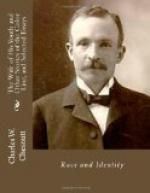Uncle Wellington hurried over the potato patch on the morning of the conversation above recorded, and as soon as he saw aunt Milly go away with a basket of clothes on her head, returned to the house, put on his coat, and went uptown.
He directed his steps to a small frame building fronting on the main street of the village, at a point where the street was intersected by one of the several creeks meandering through the town, cooling the air, providing numerous swimming-holes for the amphibious small boy, and furnishing water-power for grist-mills and saw-mills. The rear of the building rested on long brick pillars, built up from the bottom of the steep bank of the creek, while the front was level with the street. This was the office of Mr. Matthew Wright, the sole representative of the colored race at the bar of Chinquapin County. Mr. Wright came of an “old issue” free colored family, in which, though the negro blood was present in an attenuated strain, a line of free ancestry could be traced beyond the Revolutionary War. He had enjoyed exceptional opportunities, and enjoyed the distinction of being the first, and for a long time the only colored lawyer in North Carolina. His services were frequently called into requisition by impecunious people of his own race; when they had money they went to white lawyers, who, they shrewdly conjectured, would have more influence with judge or jury than a colored lawyer, however able.
Uncle Wellington found Mr. Wright in his office. Having inquired after the health of the lawyer’s family and all his relations in detail, uncle Wellington asked for a professional opinion.
“Mistah Wright, ef a man’s wife got money, whose money is dat befo’ de law—his’n er her’n?”
The lawyer put on his professional air, and replied:——
“Under the common law, which in default of special legislative enactment is the law of North Carolina, the personal property of the wife belongs to her husband.”
“But dat don’ jes’ tech de p’int, suh. I wuz axin’ ’bout money.”
“You see, uncle Wellington, your education has not rendered you familiar with legal phraseology. The term ‘personal property’ or ‘estate’ embraces, according to Blackstone, all property other than land, and therefore includes money. Any money a man’s wife has is his, constructively, and will be recognized as his actually, as soon as he can secure possession of it.”
“Dat is ter say, suh—my eddication don’ quite ‘low me ter understan’ dat—dat is ter say”——
“That is to say, it ’s yours when you get it. It is n’t yours so that the law will help you get it; but on the other hand, when you once lay your hands on it, it is yours so that the law won’t take it away from you.”
Uncle Wellington nodded to express his full comprehension of the law as expounded by Mr. Wright, but scratched his head in a way that expressed some disappointment. The law seemed to wobble. Instead of enabling him to stand up fearlessly and demand his own, it threw him back upon his own efforts; and the prospect of his being able to overpower or outwit aunt Milly by any ordinary means was very poor.




